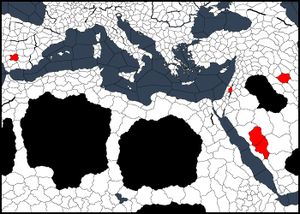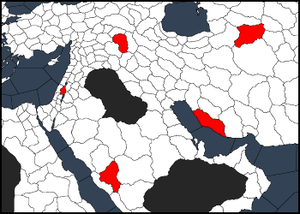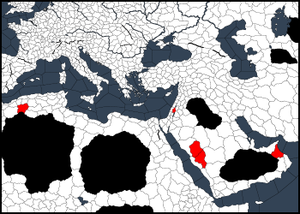小无编辑摘要 |
|||
| 第177行: | 第177行: | ||
对于穆斯林,封建封臣和神职封臣的税收和征兵法律合并为伊克塔税收和征兵法律。伊克塔默认的税率比一般的封建制税率要高,所以穆斯林国王一般要比基督教国王要更加富有。由于天主教主教和教宗特别的税收模式,如果是和天主教国家相比的话这个差距将更加明显。 | 对于穆斯林,封建封臣和神职封臣的税收和征兵法律合并为伊克塔税收和征兵法律。伊克塔默认的税率比一般的封建制税率要高,所以穆斯林国王一般要比基督教国王要更加富有。由于天主教主教和教宗特别的税收模式,如果是和天主教国家相比的话这个差距将更加明显。 | ||
=== 无惩罚剥夺公爵头衔和 | === 无惩罚剥夺公爵头衔和 剥夺 封臣=== | ||
与封建制和部落制不同,伊克塔政体统治者可以无惩罚剥夺公爵头衔和 | 与封建制和部落制不同,伊克塔政体统治者可以无惩罚剥夺公爵头衔和 剥夺 封臣,并且不会被认为是暴政。不用说,当某个封臣过于强大时这会非常有用——如果封臣胆敢造反,这意味着你甚至有机会把省份一统剥夺! | ||
=== 禁止叔侄辈之间的通婚 === | === 禁止叔侄辈之间的通婚 === | ||
2019年4月4日 (四) 15:17的版本
穆斯林(英文:Muslims)意为伊斯兰教(英文:Islam)的信徒,《王国风云2》中六大宗教组之一。在![]() 伊斯兰之剑 DLC激活后,玩家可以扮演非游牧政体的穆斯林统治者。
伊斯兰教拥有许多其他宗教没有的机制,需要特殊的策略。一般来说,扮演穆斯林角色会牺牲领土的稳定性以换取对个人特质和基因池的更好控制。当二者都能被妥善管理时,角色的领地通常会比大多数基督教徒要强大。然而,事情也很容易转向另一个极端,让你的领地在一眨眼的功夫就土崩瓦解。
伊斯兰之剑 DLC激活后,玩家可以扮演非游牧政体的穆斯林统治者。
伊斯兰教拥有许多其他宗教没有的机制,需要特殊的策略。一般来说,扮演穆斯林角色会牺牲领土的稳定性以换取对个人特质和基因池的更好控制。当二者都能被妥善管理时,角色的领地通常会比大多数基督教徒要强大。然而,事情也很容易转向另一个极端,让你的领地在一眨眼的功夫就土崩瓦解。
通常,在早期的开局时间伊斯兰教是一个很强大的宗教。和弱小破裂的基督教国家相比,伊斯兰教拥有数个大型王国和帝国,只有拜占庭帝国能够作为东正教的希望之光。在后期剧本,虽然随着时间推移基督教实力逐渐增长,而许多伊斯兰国家因家族分裂而走向破碎,但伊斯兰教不论在《王国风云2》游戏内外仍然十分强大。
教派与特性
伊斯兰教拥有三大教派:逊尼派、什叶派、伊巴底派,他们拥有一些相同的特性:
- 伊克塔政体是一种特殊的封建制度,能够使角色无惩罚地持有神殿地产(因此,穆斯林国家不存在神职人员)。伊克塔也允许暴政——可随意剥夺公爵头衔以及随意剥夺封臣。另外,在
 御前会议DLC未激活时,法律可由领主花费虔诚自行改变而不需要由封臣投票决定。
御前会议DLC未激活时,法律可由领主花费虔诚自行改变而不需要由封臣投票决定。
- 虽然下属的神殿持有者依然会为领主提供虔诚,但并不会像其他宗教一样在宗教界面列出。
- 影响宗教好感的增/减益对穆斯林国家无效,包括来自七美德或七宗罪的好感修正、来自神学生活重心的+20宗教好感、加入赫尔墨斯学会的-10宗教好感、以及向犹太人借款的-10宗教好感。
- 伊克塔和部落制的穆斯林统治者被限定使用男性开放(又名土耳其式、突厥式)继承法,将所有头衔给予最强大的儿子(或者孙子)。由此,通过继承分割或者联合头衔都非常罕见。
- 一夫多妻制允许穆斯林男性最多可娶四位妻子。
- 腐化将会削弱伊克塔政体和部落制政体下的强大家族,允许领主剥夺腐化者的头衔(通过伊斯兰教法裁判),甚至可以使帝国分崩离析。
- 兄弟和同父异母兄弟间的敌意:兄弟间互相拥有-20好感,同父异母兄弟则是-40好感。
 赛义德特质通过穆罕默德的男性家族后裔传递。具有赛义德特质的母亲则可使她的儿子获得
赛义德特质通过穆罕默德的男性家族后裔传递。具有赛义德特质的母亲则可使她的儿子获得 米尔扎特质。两个特质都能提高穆斯林对自己的好感,而且能更容易的创建哈里发头衔.
米尔扎特质。两个特质都能提高穆斯林对自己的好感,而且能更容易的创建哈里发头衔.- 与相同教派国家交战期间,角色每月会损失一些虔诚
- 更多的宣战理由:
- 省份征服:花费50虔诚,穆斯林统治者可以试图夺取任一相邻的省份。如果攻击方是公爵或以上的等级并获胜,则该省份会被附庸,否则将会被胜利方夺取。
- 入侵: 花费1000虔诚,穆斯林统治者可以试图征服某个相邻的异教统治者控制下的位于一个法理王国境内的所有土地。如果取胜,该王国法理下的所有封臣将会转移给胜利者, 而被法理外领主控制的省份将会被夺取。
- 特殊的圣战宣战理由:
- 穆斯林不仅能够对同教派的异端和异教徒,还能对其他教派的非异端穆斯林使用圣战宣战理由。
- 在十字军、吉哈德和大圣战解锁之前,穆斯林即可对两个海区以内的国家发动圣战,也能被两个海区以内的国家作为圣战目标。
- 穆斯林在对非穆斯林圣战胜利后会附庸夺得的头衔而不是篡夺头衔。
- 穆斯林在圣战胜利后会减少腐化值,但在输掉圣战后会增加更多的腐化值。
- 特殊决议:
- 去麦加朝圣,一个与其他宗教的朝觐事件链相似的事件链。与其他宗教需要选择
 神学生活重心不同的是,该事件链随时可用。
神学生活重心不同的是,该事件链随时可用。 - 庆祝斋月,所有健康的穆斯林都要在这个月的白天禁食。该节日事件链每五年可执行一次,提供虔诚奖励和腐化值降低,还能增加特质。
- 给予施济以赎罪(自愿慈善):捐出年收入的25%用于慈善工作,可增加虔诚并提高与哈里发(如果存在)的好感(哈里发自身不能使用该决议)。
- 去麦加朝圣,一个与其他宗教的朝觐事件链相似的事件链。与其他宗教需要选择
大多数教派和异端都拥有一个被称为 哈里发或谢赫的宗教领袖,他们比基督教的教宗或者牧首拥有更多的世俗权利。哈里发或谢赫能够使用特殊的宣战理由——哈里发的征服——来对一个同宗教统治者发动王国征服。他们也能够发动吉哈德来从异教徒手中征服王国。与基督教、犹太教和马兹达教宗教领袖不同的是,玩家可以扮演穆斯林宗教领袖。(这一点与![]() 逝往神灵DLC中的改革的日耳曼多神教英雄王或者
逝往神灵DLC中的改革的日耳曼多神教英雄王或者![]() 其他选择世俗领导方式的改革多神教宗教领袖相似。)
其他选择世俗领导方式的改革多神教宗教领袖相似。)
除雅兹迪派之外,所有的伊斯兰教都共享三处圣地(另外两处则各异):
- 麦加:先知穆罕默德的出生地,也是他第一次接受古兰经天启的地方。每一位有经济和有体力的穆斯林一生中都必须前往麦加进行一次麦加朝觐(英文:hajj),此为伊斯兰教“五功”之一。
- 麦地那:历史上是伊斯兰教的世俗首都,穆罕默德及其追随者曾逃亡此处躲避迫害。
- 耶路撒冷:亚伯拉罕宗教的圣地。根据伊斯兰教教义,神明在穆罕默德接受古兰经天启时曾与他夜访耶路撒冷。
- 麦加和耶路撒冷都是重要的

 丝绸之路省份。
丝绸之路省份。
- 麦加和耶路撒冷都是重要的
 逊尼派
逊尼派
Much like the Great Schism in Christianity, the Sunni-Shi'a split is a defining schismatic moment in Islam's history, though its roots are mainly political rather than theological: a disagreement over the succession of the caliphate immediately following the Prophet Muhammad's death in 632 A.D. This led to an extended period of civil war resulting in the violent deaths of three of the first four caliphs.
Sunni Islam, which won the initial sectarian conflict, holds that the Prophet Muhammad's rightful successor and therefore first Caliph of Islam was his father-in-law Abu Bakr. It has historically been the majority denomination. Sunnis' unique holy sites are Baghdad (shared with Nestorian Christians) and Cordoba (shared with Aztecs).
- Baghdad is an important

 Silk Road county.
Silk Road county.
With the ![]() Sons of Abraham DLC, Sunnis can select between the
Sons of Abraham DLC, Sunnis can select between the ![]() and
and ![]() traits, representing belief in a particular flavor of Sunni Islam. Mutazilite adds +5 learning and provides technology boosts, while Ashari prevents personal decadence and provides piety boosts. Each trait has +15 same opinion and -25 opposite opinion.
traits, representing belief in a particular flavor of Sunni Islam. Mutazilite adds +5 learning and provides technology boosts, while Ashari prevents personal decadence and provides piety boosts. Each trait has +15 same opinion and -25 opposite opinion.
Sunnis gain a holy order, the Bektashi Order, if jihads are unlocked and either the year is 1228, or either Baghdad, Damascus, Cairo, Jerusalem or Mecca are not controlled by a Muslim character.
Notable Sunni realms in Crusader Kings II's timeframe include:
- The Umayyad Sultanate of Andalusia in
 769, which usually expands to encompass all of the Empire of Hispania unless the player character intervenes. At the Stamford Bridge start, the empire has shattered into a dozen smaller realms, and Catholic Castille has taken most of Spain by the Rise of the Hansa start.
769, which usually expands to encompass all of the Empire of Hispania unless the player character intervenes. At the Stamford Bridge start, the empire has shattered into a dozen smaller realms, and Catholic Castille has taken most of Spain by the Rise of the Hansa start. - The Abbasid Empire controls most of the Middle East from Egypt to Pakistan in 769. The empire still exists in
 867, but is weakened.
867, but is weakened. - The Seljuk Sultanate is a significant powerbase in all bookmarks it is present in.
- In the Hundred Years' War start, the Mongol Golden Horde is Sunni.
Sunni heresies 
Sunni Islam has two playable heresies, Yazidism and Zikrism.
- Yazidi
- Yazidism is a monotheistic faith native to what is now central Iraq, believing God to have placed the Earth in the care of seven angels. Historically the Yazidis were persecuted well into the 21st century AD as purported polytheists and/or devil worshippers, as the Peacock Angel Melek Taus is equated by some to Iblis. In Crusader Kings II, the faith is implemented as a Sunni heresy with additional unique mechanics.
- Yazidism has its own unique set of holy sites, Nishapur, Dashtestan, Mosul, Mecca, and Jerusalem (the latter two shared with other Islamic denominations). No Yazidi rulers exist in the game by default, though the counties of Mosul and Kurdistan are majority Yazidi beginning in the Latin Empire bookmark.
- A Yazidi ruler who controls Mosul can declare themselves the Yazidi Sheikh, a caliph-equivalent religious head, by decision for 1000 Piety. In addition to the common powers of caliphs and sheikhs, the Yazidi Sheikh has the power to excommunicate characters. Being
 or
or  has no effect on the decision.
has no effect on the decision.
- Zikri
- Zikrism, also called Mahdavia, is a sect founded in India in the late 15th century (making its inclusion in Crusader Kings II ahistorical). It follows the teachings of Syed Muhammad Jaunpuri, who declared himself the messianic figure Imam Mahdi before the Kaaba in Mecca.
- Zikrism has no available religious head and thus cannot declare jihads. However, it is regarded as one of the better religions in Europa Universalis IV, so it may be useful to a player who plans to export their save to the next game.
 什叶派
什叶派
Shi'ism, historically centered in Persia and later Iran, holds that Muhammad's rightful successor as caliph was his son-in-law Ali ibn Abi Talib (the 4th Caliph by the Sunni succession), rather than Abu Bakr. Shi'a's unique holy sites are Al Nadjaf and Damascus (Damascus is an important ![]()
![]() Silk Road county and shared with Judaism). If there is no Shi'a Caliph, a Sunni realm may experience a Rise of the Shia Caliphate event rebellion.
Silk Road county and shared with Judaism). If there is no Shi'a Caliph, a Sunni realm may experience a Rise of the Shia Caliphate event rebellion.
Shi'a rulers and provinces exist at every start date, though they are more powerful as time goes on. The most powerful Shi'a realm in Crusader Kings II is the Ilkhanate in the Hundred Years War bookmark, a relatively large empire spread from the Caspian Sea to Pakistan. The Fatimid dynasty in the 1066 start holds Egypt and Jerusalem, as well as the Shi'a Caliphate, and is the strongest Shi'a realm in the standard bookmarks, though the Catholic Crusades targeting Jerusalem from the 1090s and onwards tend to severely reduce their strength.
Shi'a gains a holy order, the Hashashin, if there are count+ Shi'a rulers in 1089 or later. Shi'ism also has a unique society in Monks and Mystics, the Assassins (who historically were the same group as the Hashashin).
Shi'a heresies 
Shi'ism has two playable heresies, Druze and Hurufi.
- Druze
- The Druze are a unitarian sect from Western Asia (most common in the Levant in modern times) that syncretizes Islamic philosophies such as Ismailism with, among others, classical Greek philosophy, Gnosticism, and Hinduism. They have frequently faced religious persecution and are not traditionally considered truly Muslim.
- Druze has no available religious head and thus cannot declare jihads.
- Hurufi
- Hurufism is a Sufi movement founded in the late 14th century by the Iranian mystic Fazlallah Astarabadi.
- A Hurufi Sheikh title may be created by decision under the same conditions as a normal caliphate.
 伊巴底派
伊巴底派
Ibadism is a primarily South Arabian and North African denomination said to predate the Sunni and Shi'a denominations, much as Coptic Christianity predates Catholicism and Orthodoxy. Ibadi beliefs are a blend of the other two major denominations. E.g. Ibadis agree with Sunnis that Abu Bakr was the rightful first caliph, but agree with Shiites that God will not show Himself to Muslims on the Day of Judgement.
Ibadis' unique holy sites are the Atlas Mountains and Suhar. Ibadi and heretical Kharijite provinces are available in North Africa and southeastern Arabia (modern-day Oman) at all dates, but no Ibadi rulers exist after The Old Gods bookmark.
An Ibadi Caliphate can be established under the same rules as a Sunni or Shi'a Caliphate. Ibadis gain a holy order, the Haruriyyah, if jihads are unlocked and one of the following counties is not under Muslim control: Hajar, Damascus, Cairo, Jerusalem or Mecca.
 伊巴底派异端
伊巴底派异端
Kharijites are a sect related to the Ibadis and deemed heretical by much of mainstream Islam. They reject doctrines of caliphal infallibility (agreeing with Sunnis, disagreeing with Shi'ites) and the Umayyad Caliphate's assertion of divine right, as well as the notion that imams and caliphs must be of the Quraysh tribe (favoring instead the quasi-democratic belief that any pious Muslim nominated by other Muslims may be caliph), and believe that any Muslim has the duty to overthrow a sinful or heretical ruler. They arose during the First Fitna, the succession crisis between Ali (who would become the 4th Sunni and 1st Shi'a Caliph) and Governor Muawiyah of Syria to succeed Caliph Uthman. Disagreeing with Ali for agreeing to arbitration to settle the dispute following his near-victory at the Battle of Siffin in 657, they rebelled against Ali and assassinated him in 661.
A Kharijite Caliphate can be established for 1000 Piety by a ruler who controls either Mecca and Medina, or Jerusalem, Damascus, and Baghdad. The Sayyid and Mirza traits have no effect. Kharijites otherwise play identically to Ibadis.
哈里发国与谢赫国
穆斯林统治者并不像基督教徒一样拥有纯粹的精神上的领袖。相反,伊斯兰宗教是由世俗的哈里发或者谢赫控制,他们通常拥有许多土地。
Managing decadence
- 主条目:Decadence
Decadence: "deterioration, esp of morality or culture; decay; degeneration"
Represents how indulgent and opulent a lifestyle you and your dynasty members lead. Islam is traditionally a religion of modesty, and so should your decadence get out of hand, your vassals will not think highly of you. If your decadence remains at 100% for too long, you risk either: A) Assassination by the Hashashin, or B) an invasion of your realm by a randomly generated tribe from the desert. The invasion will come in the form of an army with very large troop numbers. Any level of Decadence above 25% is detrimental in general, whereas if below 25%, it offers bonuses. The higher the decadence, the lower your demesne income, and the lower the morale of your troops. (Neutral point is 25%.)
Muslim patricians do not have decadence. In return, they cannot hold mosques in their demesne without penalty.
Decadence can be increased or decreased through various methods.
The following will increase decadence:
- Game events/decisions
- Males of your dynasty with the
 trait. The chance to get this is increased by having sinful traits and decreased by being landed and having virtuous traits.
trait. The chance to get this is increased by having sinful traits and decreased by being landed and having virtuous traits. - Losing holy wars
The following are ways to manage decadence:
- Game events/decisions
- "Straightening up" decadent members of your Dynasty via a special button in the Religion tab. They may or may not accept, resulting in more actions (being able to imprison him or persuading him further)
- Giving titles to members of your dynasty
- Going on Hajj
- Observing Ramadan (various events will give you the option to lower decadence. However, if your character has negative traits, events may occur which forces your decadence to go up instead.)
- Invasion by a desert tribe (when a tribe invades you for having too much decadence, you instantly lose 50% decadence)
- Winning sieges and battles decreases Decadence
- Winning holy wars and contributions during jihads.
- If all else fails, killing the decadent member will remove both them and their
 trait. Banishing them will stop their contribution to the dynasty's decadence score if your realm is the largest one controlled by your dynasty.
trait. Banishing them will stop their contribution to the dynasty's decadence score if your realm is the largest one controlled by your dynasty.
As can be seen above, the larger your dynasty, the more difficult it becomes to manage decadence. This game mechanic is a curse for the large caliphates but a blessing for the smaller ones, and since dynasties with lower decadence will have a combat bonus, this gives smaller independent Muslim states a fighting chance. Furthermore, as Muslim rulers have more wives, this produces larger dynasties which then makes decadence management more difficult. One strategy for managing decadence is to marry wives who are past child-bearing age, but still have one or two to bear the required heir(s).
The chances to gain the ![]() trait increase with sinful traits such as
trait increase with sinful traits such as ![]() , and
, and ![]() . Landless characters are also more likely to become decadent.
. Landless characters are also more likely to become decadent.
一夫多妻制
- 主条目:一夫多妻制
伊克塔政体
一夫多妻制既是福音也是诅咒。一夫多妻制的好处是基本不会缺少有能力的男性继承人。此外,通过土耳其继承法,可以在众多子嗣中选择拥有正面遗传特质的人授予土地,使其成为继承人。 与其他宗教仅能拥有一位妻子不同,穆斯林可以拥有最多四位妻子,从而可以更多选择拥有好的特质的妻子而不用离婚。不管是正妻还是其他妻子,穆斯林都可以通过婚姻缔结互不侵犯协议和同盟。一夫多妻制的坏处则是,虽然有最多四位妻子,但只有一位是正妻。正妻拥有非常荣耀的地位,其他拥有高密谋属性的妻子会为了让自己成为正妻而铤而走险(比如谋杀正妻)。各个妻子也会谋害其他妻子的孩子,以确保自己的孩子能成为继承人。
针对这个坏处,一个好的对策是统治者拥有高密谋属性并且任命一位称职的间谍总管。通过指派间谍总管在首都执行密谋任务,针对正妻和继承人的密谋将会被发现,之后你可以让密谋者停止密谋,或者逮捕她们并驱逐或者处决,这取决于你的残暴程度。
另一个对策则是选择一位高密谋属性的正妻。虽然大多数统治者都会选择具有良好特质的妻子,但如果选择一位高密谋属性的妻子并让她的孩子成为继承人,那么她将不会密谋加害你或者你的孩子。不过选择正妻的孩子作为继承人也可能出现问题:这个孩子也许不是最好的继承人,其他妻子的孩子中有更好的选择。
一个折中方案是娶两位带有优良特质的年轻妻子,再娶两位40岁的妻子(40岁是可为统治者安排婚姻的最大年龄)。
部落制
部落制穆斯林采用纳妾制度。注意:部落统治者不能向伊克塔政体统治者请求纳妾。你必须从伊克塔政体国家邀请女性到你的宫廷,然后再纳妾。
商业共和国
一夫多妻制是穆斯林商业共和国的一大优势,因为他们不用考虑腐化,同时家族的贸易站上限也会因贵人宫廷中拥有大量无地的男性家族成员而增加。一夫多妻制的穆斯林也能更容易地拥有大量合法子嗣(一次最多十名)。
继承管理
- 主条目:土耳其继承法
你的父亲已经乘着白骆驼去极乐世界享用葡萄干了。你拥有着最多或者最好的头衔,也就是说你是他的继承人。由于你的父亲有很多妻子,你很有可能树敌众多。现在是开始为未来的腐化做好准备的最佳时机。在继承时,游戏将模拟奥斯曼土耳其时代的继承法(即先到达首都的儿子会清除所有兄弟并继位)。
如果顺利的话,你的父亲会因为你的继承而娶1到2个年纪大的妻子(至少45岁;要使用角色查找器,因为“结婚”按钮中的女性配偶人选的最大年龄为40岁),同时教育你的兄弟们获得安于现状或者美德特质,这应该差不多可以抵消兄弟或同父异母兄弟之间的好感惩罚。
御前会议
- 主条目:选举君主制
御前会议DLC激活后,穆斯林国家可以使用选举君主制继承法。这需要内阁法“完全内阁权利”。
其他特点
伊克塔政体封臣义务
对于穆斯林,封建封臣和神职封臣的税收和征兵法律合并为伊克塔税收和征兵法律。伊克塔默认的税率比一般的封建制税率要高,所以穆斯林国王一般要比基督教国王要更加富有。由于天主教主教和教宗特别的税收模式,如果是和天主教国家相比的话这个差距将更加明显。
无惩罚剥夺公爵头衔和剥夺封臣
与封建制和部落制不同,伊克塔政体统治者可以无惩罚剥夺公爵头衔和剥夺封臣,并且不会被认为是暴政。不用说,当某个封臣过于强大时这会非常有用——如果封臣胆敢造反,这意味着你甚至有机会把省份一统剥夺!
禁止叔侄辈之间的通婚
除了雅兹迪派,所有教派的穆斯林都不允许叔侄辈之间的通婚(如叔父与侄女、姨母与侄儿等)。
法律变更
与基督教国家不同,穆斯林国家不会为法律变更投票。穆斯林统治者可以根据自己的意愿变更法律。然而,根据法律类型的不同,变更法律需要花费少量虔诚(变更直辖领法律需要50虔诚,变更王权法需要100虔诚)。
不过,当![]() 御前会议DLC激活时,如果内阁法中的“内阁授权”启用,法律变更程序将和一般的封建政体国家一样。
御前会议DLC激活时,如果内阁法中的“内阁授权”启用,法律变更程序将和一般的封建政体国家一样。
限制使用 狂欢生活重心
狂欢生活重心
穆斯林不能选择这个生活重心,除非拥有![]() 腐化、
腐化、![]() 酒鬼或者
酒鬼或者![]() 享乐主义者特质。另外,AI穆斯林角色绝对不会同意参加小型聚会,除非他们也拥有上述特质之一。
享乐主义者特质。另外,AI穆斯林角色绝对不会同意参加小型聚会,除非他们也拥有上述特质之一。



